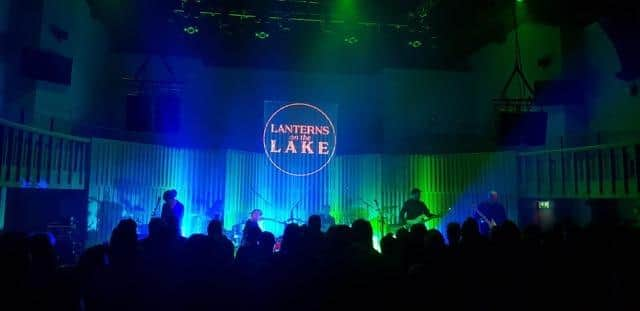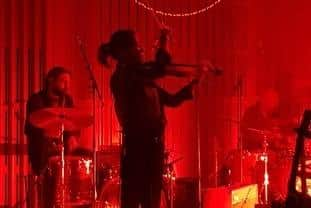The Tyneside quartet’s intelligent alt-rock soars to the rafters in one of their favourite venues.


Atmospheric. Lush. Elegant. These are the kind of words that usually appear in album reviews for Lanterns on the Lake. The Tyneside quartet, who formed in 2007, seem designed to be heard back-to-back with the similarly minded Daughter.
Live they’re a different beast entirely, which is immediately signalled by the presence of two drum kits. One of these is occupied by Radiohead’s Philip Selway, who produced the band’s fifth and current album Versions of Us and who stepped in when original drummer Oliver Ketteringham quit mid-recording.
He’s joined on the second kit by Matt Hardy, who may not make it to another gig after saying that frontwoman and songwriter Hazel Wilde’s black midi-dress makes her look like an “evil headmistress”. There may be an element of truth in it. But it’s also true that him and Selway make a powerful double-act; there’s no flashy soloing or Adam and the Ants-style theatrics but they provide a solid backbone for the band’s material.








In this context the songs retain their atmospherics, with Paul Gregory’s lead guitar taking on a shimmering quality on ‘Baddies’ and Angela Chan’s violin creating a folk-rock feel to ‘String Theory’. The dreaminess of their studio recordings is nonetheless replaced with intelligent alt-rock that soars to the rafters of the Howard Assembly Room on what is, according to Wilde, the fullest it’s ever been.
The passionate live dynamics do occasionally come at the expense of pacing. Much needed breathing space isn’t provided until near the set’s close with the slow-build ‘Lungs Quicken’ and percussion-free ‘Ships in the Rain’.
In ramping up the sound, however, the band do effectively bring into greater focus the anger found in some of the lyrics. Opening track ‘The Likes of Us’ describes communities failed by austerity, where “oblivion howls for these gutted streets, boarded shops cower in defeat.” Elsewhere, ‘Blue Screen Beams’ deals with asylum seekers as Wilde rails “we don’t need a wall, we need a bigger boat”.
Rather than give in to despair, these tracks offer political as well as personal hope. The set ends with ‘Last Transmission’, which is the band at their most musically epic. Building from just Wilde’s austere voice and e-piano, it spirals into a short squall of noise after she concludes that, “in the last gasp of this old world, I think I found the beauty and the good”.
It’s a line that also neatly sums up the gig.
This post was originally published on this site be sure to check out more of their content.

